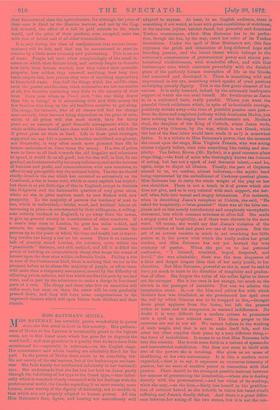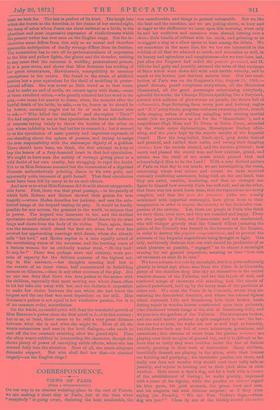MISS BATEMAN'S MEDEA..
MISS BATEMAN has certainly grown wonderfully in power since she first acted in Leah in this country. Her perform- ance of Medea at the Lyceum is occasionally grand in the highest sense, not in that baser sense which has gone far to degrade the word itself ; and true grandeur is a quality that we have been little accustomed to,—especially in actresses,—on the English stage. Her countenance and whole bearing are admirably fitted for the part. In the person of Medea there needs to be something visi- ble not merely of the enc'Hintress, but of the barbaresque enchant- ress. She feels keenly her intellectual inferiority to her husband's race. She understands that she has lost her hold on Jason partly through the inferiority of her type to the Greek type,—that inferi- ority which is somehow closely connected with her dealings with the preternatural world, the Greeks regarding it as more seemly, more human, more worthy of the dignity of humanity, not to meddle in that which was not properly adapted to human powers. All this Miss Bateman's face, figure, and bearing are marvellously well adapted to express. At least, to an English audience, there is something if not weird, at least with great capabilities of weirdness, in the anxious, joyless, hatchet-faced, but powerful and dominant Yankee countenance, which Miss Bateman has in its perfec- tion, though she has, by the way, cared her voice of its Yankee intonations. Under the spell of Miss Bateman's art, this face expresses the griefs and exhaustion of long-deferred hope and brooding passion, and the latent threat which belongs to the sorceress's consciousness of preternatural power and almost pre- ternatural vindictiveness, with wonderful effect, and with that barbaresque tone which contrasts powerfully with the finished grace of the perfectly human conception of life as the Greeks had conceived and developed it. There is something wild and ungoverned in her eye, something which speaks of cruel passions underlying queenly dignity. This is the first great element of her success. It is sadly lessened, indeed, by the extremely inadequate support of which she can avail herself. Mr. Swinbourne as Jason is, to a cultivated taste, really painful. Where you want the graceful Greek selfishness which, in spite of indomitable courage, positively shrinks away—the time of youthful passion once past— from the fierce and suspicious jealousy which dominates Medea, you have nothing but the stagey hero of melodramatic art. Medea'a rival, the daughter of the King of Corinth, whom Jason weds, Glaucea (why Glances, by the way, which is not Greek, while the loss of the final letter would have made it so?) is somewhat better. It is a tribute to Miss Bateman's power, that the moment she comes upon the stage, Miss Virginia Francis, who was acting almost vulgarly before, rises into something like reality and sim- plicity. The father, &eon (Mr. Ryder), is a good common-place stage-king,—the kind of actor who thoroughly knows the business of acting, but has not a spark of real dramatic talent,—and he, again, helps to dispel all illusion. Finally, the part of Orpheus seemed to us, we confess, almost ludicrous,—the mystic bard being represented by the embodiment of Cockney-poetical gloom MissBateman has to carry the whole weight of the play on her own shoulders. There is not a touch in it of power which she does not give, and as is very natural with such support, she her- self often falls into unreal and stagey intonations. For instance, when in describing Jason's reception at Colchis, she said, "He asked for hospitality,—'twas granted!" there was all the false em- phasis laid on this merely introductory and completely unemphatic statement, into which common actresses so often fall. She made a stagey point of hospitality, as if there were rhetoric in the mere word. Of course, she would say that Jason's violation of the sacred relation of host and guest was one of her points. But the art of an actress consists as much in not overdoing her little points as in the power with which she really makes her great strokes, and Miss Bateman has not yet learned the true economy of passion. When she got on to her personal confession, " I listened, trembled, hoped, despaired, and loved," she was admirable ; there was the true eloquence of a later and deeper despair than that of her early youth, in her elocution. But Miss Bateman, powerful as she is, must be said to have yet much to learn in the direction of simplicity and gradua- tion of effect. She forgets the value of the softer lights to throw out the stronger. She is too even in her energy, too much on the stretch in the passages of narrative. Nor can we admire the incantation scene. It,—or the blue and yellow fire with which Medea's face was irradiated as she pronounced her spell over the veil by which Glances was to be wrapped in fire,—brought down great applause from the house, but left the present writer at least and his companion in amused indifference. No doubt it is very difficult for a modern actress to pronounce such a spell as that without rant. The ideas proper to the sorceress are not in our air. We cannot believe in the working of such magic, and that is apt to make itself felt, and the actor too often supplies their place by a very different thing,— the force of malediction. It seems to us that Miss Bateman falls into this mistake. Her words come forth in a torrent of spasmodic and concentrated malediction. She does not seem to thrill with awe of the powers she is invoking. She gives us no sense of shuddering at her own necromancy. It is like a modern curse expanded,—that is to say, it expresses an enormous intensity of passion, but no sense of creative power in connection with that passion. There should be the strongest possible contrast between her manner of pronouncing the incantation,—where she is dealing directly with the preternatural,—and her vision of its working, when she may,—as she does,—fairly lose herself in the gratifica- tion of satiated hatred as she beholds in vision her hated rival's suffering and Jason's deadly defeat. And there is a great differ- ence between her acting of the two scenes, but it is not the con-
treat we look for. The last is perfect of its kind. The laugh into which she bursts as she describes, in the trance of her second sight, the heap of ashes whom Jason can alone embrace as a bride, is the ghastliest and most impressive expression of vindictiveness which the present writer has ever seen on the English stage. But the in- cantation scene differs from this only as an unreal and therefore spasmodic anticipation of deadly revenge differs from its fruition. The incantation has to owe all its preternaturalness of impression to the blue and yellow lights, the gloom and the thunder, nothing to any sense that the sorceress is wielding preternatural powers. It is a poor scene, and shows that Miss Bateman has nothing of her great countryman, Hawthorne's, susceptibility to uncanny conceptions in her nature. She found in the strain of artificial passion but a poor equivalent for the thrill of meddling in preter- natural affairs. She was never so little weird as in that scene. And to make an end of cavils, we cannot agree with those,—some of them excellent critics,—who greatly admired her last word in the play,—we mean her answer to Jason, when, the moment after the fearful death of his bride, he asks,—as he, frozen as he should be by horror, certainly ought not to be at such an instant able to ask,—" Who killed the children ?" and she replies "Thou!" We had expected to see in that ejaculation the fierce self-defiance of remorse trying vainly to throw the burden of the crime on him whose infidelity to her had led her to commit it ; but it seemed to us the ejaculation of mere queenly and imperious reproach, of one standing above the sphere of passion, and trying to assign the true responsibility with the statuesque dignity of a goddess. There should have been, we think, the first attempt to keep at bay the horror of a fury-haunted heart in that last ejaculation. We ought to have seen the satiety of revenge giving place to a wild doubt of her own cruelty, but drugging to repel the doubt. Yet to us Miss Bateman seeemed but the incarnation of a dignified Nemesis authoritatively pointing Jason to his own guilt, and apparently quite innocent of guilt herself. That final ejaculation must have been felt by many to be an anti-climax.
And now as to what Miss Bateman did do with almost unapproach- able force. First, there was that great passage,—in the parody of which both Robson and Ristori showed their genius for true tragedy,—where Medea describes her jealousy, and uses the cele- brated image of the leopard tearing its prey. It would be hardly possible for any actress, the greatest in the world, to surpass that in power. The leopard was incarnate in her, and the thrilled spectators could almost see the streams of blood drawn by its cruel fangs and claws from the body of its victim. Then, again, there was the sentence which closed the first act, when her rival has avowed her approaching marriage with Jason, whom she already calls "her lord," and Medea replies in a tone equally mixed of the scrutinising vision of the sorceress, and the loathing scorn of a furious woman for an evidently weaker rival, "He thy lord It may be !" There was perhaps more real subtlety, more pro- mise of capacity for the delicate nuances of the highest act- ing in this sentence,—her thoughts seeming half lost in the reverie of an inner vision, half concentrated in forbidding menace on Glaucea,—than in any other sentence of the play. But no one can deny that there was true pathos in the scenes with the children, especially that most moving one where Jason offers to let her take one away with her, and she declares it impossible to make her choice between the one whom she had loved the longest and the one that was most dependent on her still. Miss Bateman's pathos is not equal to her vindictive passion, but it is of no common order, nevertheless.
On the whole, no candid critic will deny the wonderful growth of Miss Bateman's power since she first acted in Leah in this country; but to us, at least, there seems to be still a very great distance between what she is and what she might be. Most of all, she wants naturalness and ease in the level dialogue,—she needs to cast off the too constant straining after the grand style. Then she often wants subtlety in interpreting the character, though she shows plenty of power of conveying subtle effects, where she has entered fully into the situation. Most of all, she wants adequate dramatic support. But who shall find her that—in classical tragedy—on the English stage?



































 Previous page
Previous page